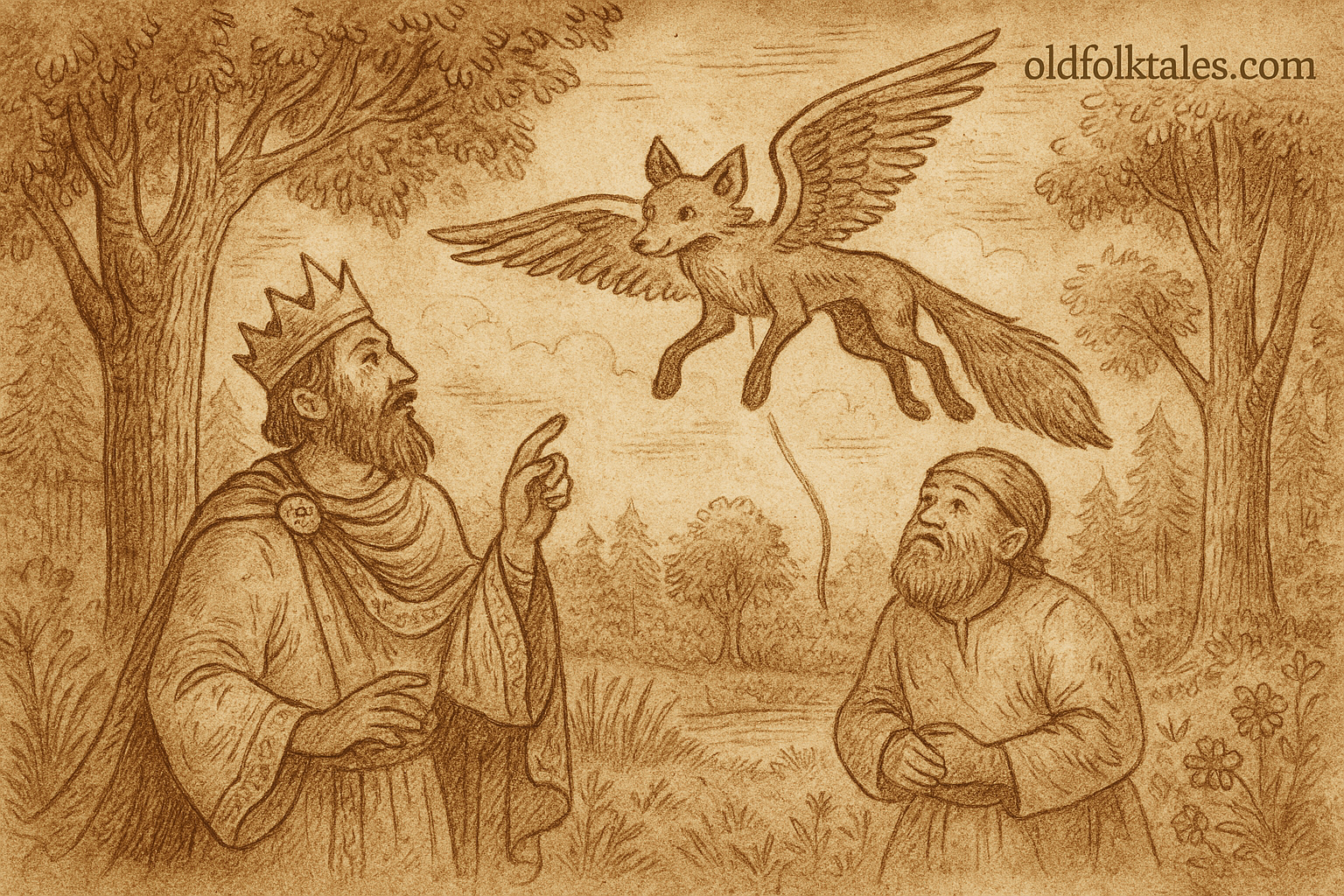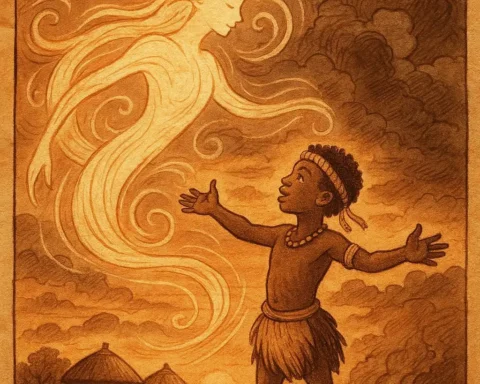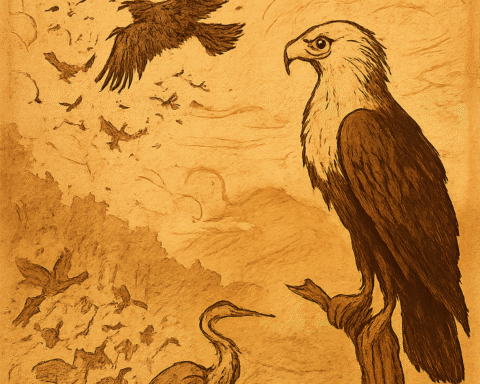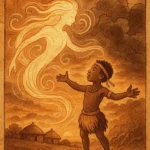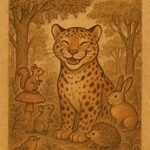Long ago in the verdant highlands of Uganda, where rolling hills stretched toward distant horizons and ancient forests whispered secrets to the wind, there ruled a powerful King whose ambition knew no bounds. This monarch, dwelling in his magnificent palace overlooking the fertile lands of his kingdom, conceived an idea that would consume his thoughts and challenge his very understanding of power and compassion.
The King dreamed of creating something unprecedented in all the land, a magnificent zoo that would display every creature that roamed the forests, jungles, and swamps of his vast realm. With great enthusiasm burning in his heart, he summoned all his chiefs from the far corners of Uganda, their colorful robes rustling as they gathered in the great hall adorned with intricate bark cloth tapestries and ivory carvings.
“Bring me animals of every kind,” the King commanded with regal authority, his voice echoing off the polished walls. “From the deepest jungle shadows to the misty mountain peaks, from the papyrus swamps to the thorny scrublands, I want representatives of all the creatures that call Uganda home.”
Also read: The Locust-Killer Lake
The chiefs, eager to please their sovereign, dispersed across the kingdom like seeds on the wind. They returned weeks later with a Noah’s ark of creatures: graceful antelopes with liquid brown eyes, massive elephants trumpeting their distress, leopards pacing restlessly with spotted coats gleaming, colorful birds whose songs had turned to mournful calls, and countless other magnificent beasts from Uganda’s rich wilderness.
The King spared no expense in creating their new home. He planted the most beautiful garden the kingdom had ever seen, with exotic flowers blooming in rainbow profusion and carefully manicured paths winding between ornate cages crafted by the finest metalworkers. Fountains sparkled in the sunlight, and shaded pavilions offered respite for the countless visitors who flocked from distant villages to marvel at this unprecedented collection.
People traveled for days to witness the King’s achievement, gasping in wonder at creatures they had only heard described in stories around evening fires. The zoo became the pride of the kingdom, a testament to royal power and ambition that drew admirers from neighboring lands.
Yet amid all this splendor and acclaim, a profound sadness pervaded the air like morning mist. The captured animals lived in perpetual misery, their wild spirits crushed by confinement. Day and night they yearned for their forest homes, remembering the thrill of the hunt, the taste of fresh stream water, and the freedom to roam wherever their instincts led them. Their food came in bowls instead of requiring skill to catch, their water in clay pots rather than crystal-clear forest pools where they once drank alongside other creatures in peaceful communion.
Among all the people who visited and admired the zoo, only one soul truly understood the animals’ anguish—the King’s dwarf companion, a wise little man whose weathered face spoke of years spent in the wild places. Having lived for many seasons in the jungle depths, he had learned the secret languages of the creatures and could read the profound sadness in their eyes.
One golden afternoon, as the King strolled proudly through his creation with the dwarf at his side, the monarch’s chest swelled with satisfaction. The late sunlight filtered through the garden trees, casting dappled shadows on the paths where peacocks strutted and exotic plants bloomed in carefully tended beds.
“Am I not a great King?” he declared, gesturing expansively at his magnificent achievement. “No ruler has ever created a zoo like this before, where all the animals of our country live together in one beautiful place.”
The dwarf paused thoughtfully, his keen eyes surveying the cages with their pacing, restless occupants. “All the animals are not here, your majesty,” he said quietly. “There is one creature that lives in the mysterious Mukono Forest which no chief has brought to you. Though its haunting cries echo through the night and everyone throughout the land has heard its voice, no human eye has ever glimpsed it.”
The King’s curiosity blazed like a torch. “Tell me more of this creature!”
“Some people claim it is a bat with wings like midnight,” the dwarf continued, his voice taking on the cadence of ancient storytelling. “Others insist it must be a sloth moving so slowly through the canopy that it becomes invisible. But the old forest dwellers whisper that it is something far more magical fairy foxes with wings woven from the very mists of night, spirits that belong neither fully to earth nor sky.”
Upon hearing these words, the King’s determination flared with renewed intensity. “I will not be defeated by any creature, magical or otherwise!” he declared, his royal pride stung by the suggestion that something in his kingdom remained beyond his reach. “I shall journey to Mukono Forest myself and capture this mysterious animal for my collection.”
Without delay, he summoned Sekibobo, his most trusted chief, a man whose loyalty had been proven through countless campaigns and whose organizational skills were legendary throughout the kingdom. “Build a grand encampment near the Mukono Forest,” the King commanded. “Spare no effort, I want pavilions worthy of a royal court, with all the comforts of palace life transported to the wilderness.”
Day and night the workers labored with dedicated fervor, their axes ringing against hardwood trees and their hammers echoing across the forest clearings. They erected magnificent tents of the finest materials, constructed comfortable sleeping quarters, and established kitchens capable of feeding an entire court. When their work was complete, the encampment stood like a temporary city at the forest’s edge, a testament to royal ambition and determination.
The King arrived with his full retinue courtiers in silk robes, guards with polished spears, servants bearing the treasures and comforts of palace life. For three long months, this wilderness court maintained its vigil at the forest’s border, while the King pursued his elusive quarry with unwavering determination.
Every night, as darkness settled over the land like a velvet cloak, the King would venture alone into the Mukono Forest’s depths. The ancient trees towered above him like cathedral pillars, their branches forming a canopy so thick that starlight barely penetrated to the forest floor. And every night, the mysterious cries would begin—haunting, otherworldly voices that seemed to mock his efforts and dance just beyond his understanding.
The sounds came from everywhere and nowhere. Sometimes they echoed from the treetops directly overhead, yet when he looked up with his torch held high, only empty branches swayed in the night breeze. Other times the cries seemed to rise from the very ground beneath his feet, but no amount of searching revealed their source. The voices would call from his right side, then his left, sometimes near, sometimes distant, weaving a symphony of mystery that filled the darkness with enchantment and frustration.
The local people, observing the King’s nightly pursuits with growing amusement, began calling these invisible creatures “enjoga” bullies for the way they seemed to tease and torment the mighty ruler who had conquered armies but could not capture a single fairy fox. Night after night, the enjoga’s laughter echoed through the forest, as if the very spirits of the wilderness were mocking human ambition.
As the third month drew to a close and the time came to return to the capital, the King sat in his pavilion with shoulders bowed by an unfamiliar weight of defeat. The usually vibrant royal court had grown subdued, sensing their monarch’s melancholy mood as preparations began for their departure.
The faithful dwarf approached his master and settled nearby, his compassionate eyes studying the King’s troubled expression. “Why is the King so deeply sad?” he asked gently.
The King lifted his head, and in his eyes burned a mixture of frustration and unexpected revelation. “I am sorry that I have no fairy fox for my zoo,” he admitted, his voice heavy with disappointment. “But there is another reason for my sadness, one that surprises me greatly. During these months in the wilderness, I have learned to love the beautiful forests and jungles with their deep, mysterious glades and shady paths dappled with sunlight. I have grown enchanted by the crystal-clear pools where wild creatures come to drink, and I have discovered that moonlight nights are never so breathtakingly lovely in my capital as they are here in this untamed country. My heart breaks at the thought of leaving all this natural wonder behind.”
The dwarf nodded with the wisdom of one who had always understood what the King was only now discovering. “If you feel such profound sadness at leaving this country after only three months,” he said softly, “imagine how much greater must be the sadness of the animals in your wonderful zoo. For them, the forests and jungles and swamps are not temporary homes to visit they are their true birthplace, their natural kingdom. In your magnificent zoo, no matter how beautiful and well-tended, they are nothing more than prisoners, forever separated from the wild freedom that is their birthright.”
These words struck the King like lightning illuminating a storm-darkened sky. For long minutes he sat in contemplative silence, his mind processing truths that his heart had perhaps always known but his pride had refused to acknowledge. The dwarf waited patiently, understanding that profound realizations cannot be rushed but must unfold in their own time like flowers opening to the dawn.
Finally, the King raised his head with new resolution burning in his eyes. He called for Sekibobo, who appeared immediately with the swift obedience that had made him so valuable to the crown.
“Send a messenger at once to the capital,” the King commanded, but now his voice carried a different quality—not the harsh authority of a ruler demanding obedience, but the gentle strength of a leader who had discovered wisdom. “Tell the Katikiro that all the animals in my zoo are to be released immediately. Every creature must be returned to its own forest or jungle or swamp, to the wild places where they belong.”
He paused, then added with firm conviction, “I will have no more prisoners in my kingdom.”
And so it was that the great zoo was disbanded, its magnificent cages opened, and its captive residents returned to the freedom of their natural homes. The beautiful garden remained, but it became a place where wild creatures could come and go as they pleased, drinking from the fountains and sheltering beneath the trees without bars or walls to contain them.
To this day, there runs a broad road from Kampala to Jinja that passes near the mysterious Mukono Forest. Travelers who journey along this route in the quiet hours of night will still hear the haunting cries of the enjoga echoing through the darkness mysterious voices that seem to celebrate the triumph of wildness over captivity, of freedom over possession.
No human eye has ever seen these fairy foxes, though their presence fills the forest with magic and wonder. Some people still insist they are simply bats fluttering through the canopy, others maintain they must be sloths moving so slowly they become invisible to human sight. But the wise ones, those who understand the deeper truths of the natural world, know they are indeed fairy foxes with wings woven from the very mists of night spirits of the wild that can never be captured, only heard and wondered at and respected from afar.
The Moral Lesson
This profound Ugandan tale teaches us that true greatness lies not in possessing or controlling nature, but in understanding and respecting it. The King’s journey from prideful collector to wise protector shows that wisdom often comes through failure and that the greatest leaders are those who can admit when they are wrong. The story reminds us that freedom is a fundamental right of all living creatures, and that sometimes the most beautiful thing we can do is simply let go and allow others to live as nature intended.
Knowledge Check
Q1: What motivated the King of Uganda to create his magnificent zoo? A1: The King wanted to demonstrate his power and greatness by collecting every type of animal from his kingdom’s forests, jungles, and swamps, creating something unprecedented that would bring him fame and admiration from visitors across the land.
Q2: Who was the only person who understood the animals’ suffering in the zoo, and why? A2: The King’s dwarf companion was the only one who understood the animals’ misery because he had lived in the jungle and learned to speak their languages, allowing him to recognize their profound sadness and longing for freedom.
Q3: What made the fairy foxes of Mukono Forest so mysterious and elusive in this Ugandan folktale? A3: The fairy foxes, called “enjoga” or “bullies,” were mysterious because their haunting cries could be heard throughout the night from all directions, yet no human had ever seen them. They seemed to exist as invisible spirits that teased anyone who tried to capture them.
Q4: How did the King’s three-month stay in Mukono Forest change his perspective? A4: Living in the wilderness taught the King to appreciate the natural beauty of forests, moonlit nights, and wild spaces, making him realize how much the captive animals must suffer being separated from their true homes in nature.
Q5: What does the dwarf’s role symbolize in this traditional Ugandan story? A5: The dwarf represents wisdom, compassion, and the voice of conscience. His ability to speak with animals and his gentle guidance help the King discover the moral truth about freedom and the rights of all living creatures.
Q6: What cultural values about nature and leadership does this Ugandan folktale promote? A6: The story emphasizes respect for nature’s wildness, the importance of wise and compassionate leadership, and the African cultural belief that true power lies in protecting rather than controlling the natural world and its creatures.
Source: Traditional Ugandan folktale from “The King of the Snakes, And Other Folk-Lore Stories from Uganda”
